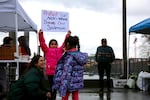
Allies and members of Yakama Nation hold a rally at the Vancouver Landing Amphitheater along the Columbia River.
Ericka Cruz Guevarra / OPB
Turning to face the water behind her, Roxanne White recalled her ancestors’ memories of the Columbia River.
“At one point, if you can imagine, they would say you could walk off the backs of the salmon across the river,” said White, a Yakama Nation descendant. “Now they’re so minimal, and they’re sick. Just like our mother earth; just like our water.”
In October, nearly 500,000 gallons of raw sewage were released into the Columbia River in two separate spills from Vancouver. Feces, urine and laundry waste rushed into the water that descendants of the Yakama Indian Tribe say is the source of salmon the tribe has relied on for generations.
“My people have been on the Columbia River for thousands of years,” said Simon Sampson, a Yakama Nation tribal member and a life-long fisherman. “Salmon is really a main diet of my people, and it’s been that way for many years. It’s a source of livelihood towards my people, and that’s why we want to protect it: for our future generations.”
On Saturday, allies and members of the Yakama Nation stood in the rain and along the river, demanding a seat at the table with local officials, environmental regulators and those responsible for the two October spills. They want to discuss their expectations for how to deal with waste in the Columbia River.
“We demand accountability,” White said. “We want more than a fine. We want a seat at the table with them. We want them to acknowledge us as a people and [acknowledge] our treaty rights, human rights.”
Tribal members say what’s happening to the Columbia River is endemic of a larger problem of officials failing to consider and correct the consequences of pollution on tribes that have historically relied on the river.
“You’re dealing with some serious infrastructural needs,” said JoDe Goudy, chairman of the Yakama Nation. “What kind of will is going to come forth to correct the detriment that has happened significantly throughout time?”